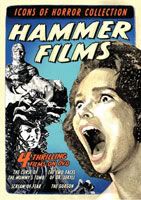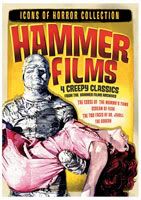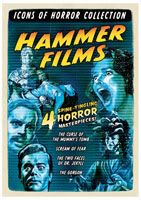May 25, 1994
John Blum (piano), William Parker (bass), Marco Eneidi (alto saxophone), Jackson Krall (drums)
Sunday, June 29, 2008
Friday, June 27, 2008
Curly takes a trip

“I never did heroin, except for one time, this guy shot me up. This white guy, down there on Sunset Boulevard. That was in 1966. He said if you ate anything that day, you’d get sick. It was a good high, but that was the last time I did that.
“That was the last time I fucked with that. I only take regular medicine, now.”
copyright © 2008 Wyatt Doyle
Thursday, June 26, 2008
Sony: Vote for the least worst!
Sony is releasing four titles from the Hammer Films archive to DVD this October: The Curse of the Mummy's Tomb, The Two Faces of Dr. Jekyll (aka House of Fright), Scream of Fear and The Gorgon.
In addition, Sony has partnered with Amazon.com on a contest to determine which of three design choices will be the set's cover art:
Now is it just me, or are all the contenders kind of shitty?
I mean, do any of the designs feel particularly "Hammer" to you?
Don't get me wrong, I'm happy to see these titles released (and for cheap, too!); but any way the contest goes, they're sure gonna have some lousy packaging.
Interested parties can vote here if they care to. You've got til the 30th.
In addition, Sony has partnered with Amazon.com on a contest to determine which of three design choices will be the set's cover art:
Now is it just me, or are all the contenders kind of shitty?
I mean, do any of the designs feel particularly "Hammer" to you?
Don't get me wrong, I'm happy to see these titles released (and for cheap, too!); but any way the contest goes, they're sure gonna have some lousy packaging.
Interested parties can vote here if they care to. You've got til the 30th.
Wednesday, June 25, 2008
Tuesday, June 24, 2008
Monday, June 23, 2008
Thursday, June 19, 2008
a real pisser

This morning I saw a young man piss himself in the street. He just stood there, stock still and locked to the spot, while a wet stain darkened the inseam of his ratty light blue jeans. Eventually it ran down over the back heel of one of his worn Chuck Taylors, splitting into a pair of tiny streams that snaked along the concrete.
copyright, © 2008 Wyatt Doyle
Wednesday, June 18, 2008
Monday, June 16, 2008
New photos by Wyatt Doyle
"The Lansdowne" by Wyatt Doyle, now on New Texture.
Click here to see the series, or click on the marquee below.
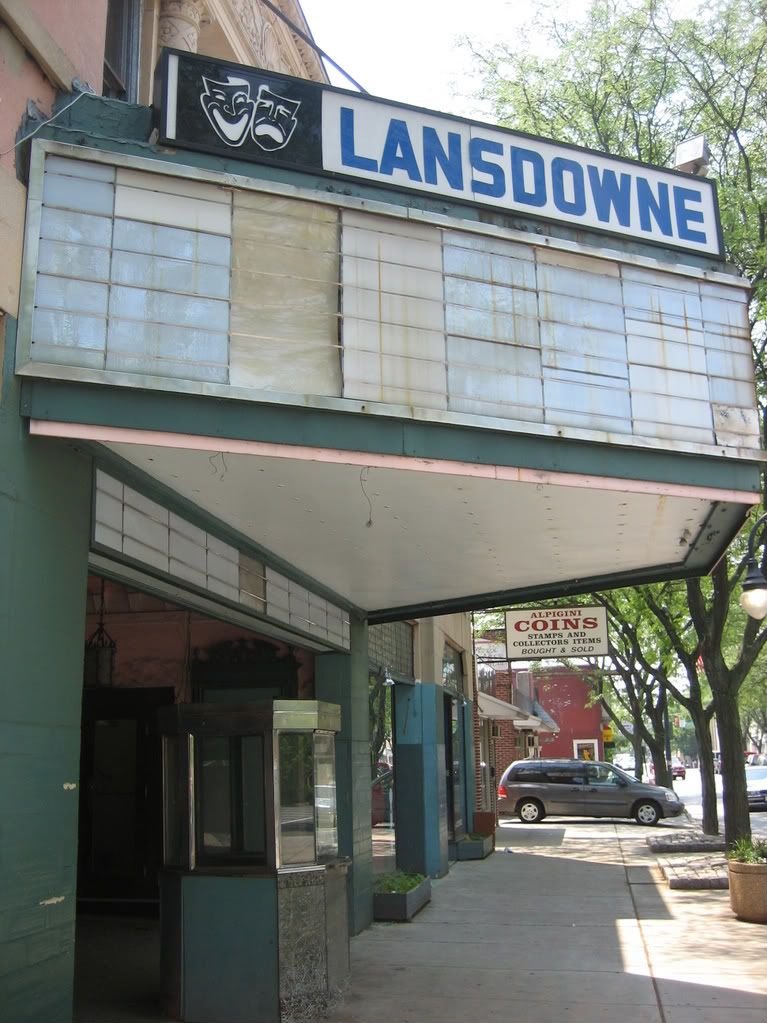
copyright © 2008 Wyatt Doyle
You may also enjoy "Valley Drive-In," located here.
Click here to see the series, or click on the marquee below.

copyright © 2008 Wyatt Doyle
You may also enjoy "Valley Drive-In," located here.
Friday, June 13, 2008
Dark Unpredictabilities

But if we are confronted with the suggestion that one age of achievement in the arts may necessarily--because of its greatness, and because of the incorrigible nature of man's mind--force a search for difference, even though that difference means a retrenchment, we become uneasy. When the change in the arts since the Renaissance is attributed to the loss of religious faith, to the growth of science, to commercialism, or to the development of mass media, we are always at liberty to feel that those circumstances may conceivably change again. But the deepest fear we have is of the mind of man itself, primarily because of its dark unpredictabilities, and with them the possibility that the arts could, over the long range, be considered as by definition suicidal: that, given the massive achievements in the past, they may have no further way to proceed except toward progressive refinement, nuance, indirection, and finally, through the continued pressure for difference, into the various forms of anti-art.
W. Jackson Bate, The Burden of the Past and the English Poet, p. 10
+ + +
Bam!
+ + +
"the arts could, over the long range, be considered as by definition suicidal"
A large scale art suicide? Is that even possible? Can it be induced?
What would that look like? (Both the suicide part and the afterwards.) What would it sound like? Maybe we're going to get to see and hear whether we want to or not.
We can all be encouraged by Bate's notion that when all collected and made into one, man's mind still retains some dark unpredictabilities.
+ + +
"Progressive refinement and nuance" reminds me of, well, you know, as well as the whole "young lions" ad campaign and "d-beat" punk--specifically the difference between Discharge and Disclose and Disfear and Disgust and Disrupt and Doom for example.
Don't get me wrong--I love love love every band who's name begins with D in that previous paragraph. I love love love them in part because they live and fulfill the revisionary ratios exactly like the major poets of the English language of the last 400 years as analyzed by H. Bloom and W. Jackson Bate.
D Beat revisionary ratios.
So why not PhD's for studying D-Beat?
+ + +
"Through the continued pressure for difference, into the various forms of anti art."
Ah anti-art. Who doesn't love a little anti-art? Anti-art is like really strong lemonade or swimming in frigid water in it's ability to get you "back into your body." Incredibly important.
When I think "Anti Art" I think "Up With People"--and when I think Up With People I get a vomit feeling.
When I think of vomit feeling, I think of Kierkegaard, particularly this little gem:
"When at a banquet, where the guests have already overeaten, one person is concerned about bringing on new courses, another about having a vomitive at hand, it is perfectly true that only the first has interpreted correctly the requirement of the guests, but I wonder whether the other might not also say that he is concerned about what the requirement might be."
Soren Kierkegaard, Concluding Unscientific Postscript
But really now...Anti-art is a tall order. It seems like a hard posture to maintain, if only because in the end, "Art" takes what it can get. What doesn't "Art" gobble up for its own ends? (Or am I thinking of capital?)
Regardless, if I'm not mistake, Disclose were all about "Noise not Music" but today's anti art is tomorrow's art and college curricula.
Is eternal "anti-art" easier or harder to achieve than eternal "art."
(Should "art" be capitalized?)
Thursday, June 12, 2008
Wednesday, June 11, 2008
Well Are They Or Aren't They?

Moreover, there is a difference in kind as well as degree. In one way especially the "literature of knowledge"--of fact and expository discussion--will always differ, as De Quincey said, from the "literature of power" and the other arts...In short, the "literature of knowledge" with its expository discussion is, even at its best, "provisional" and can always be superseded. But the Iliad or King Lear will not be dislodged with the same ease or excuse. They are, as De Quincey said "finished and unalterable"--like every other work of art, however minor. To feel constraints in the competition with even the greatest scholars and critics of the last fifty years is not, in other words, the same thing as to be in competition with Michelangelo, Shakespeare, Rembrandt, Bach, Beethoven, Dickens, or Mann (or Coltrane, Dixon, Dolphy, Gayle, Lyons, Taylor, or Frank Zappa for that matter) and with the finalities that the works of such men present.
W. Jackson Bate: The Burden of the Past and the English Poet, p. 8
+ + +
Alterable or inalterable? Final or not final?
Can the eggs be unfried? Can the rice be unburnt?
Can there be a "literature of knowledge" without the "literature of power?"
Does the "literature of power" need a "literature of knowledge?"
Are they both equal in value and utility, or is one subordinate to the other?
Can the music of John Coltrane be "dislodged?" Can the music of Frank Zappa be "dislodged? "
If so, by whom? Barbarians crashing through the gate?
If so, how? How is this dislodging done? By not playing it "right?"
How can a work that is already done by the do-er to the do-er's specifications be done any more definitively? And more to the point, how can a work that is already done by the do-er to the do-er's specifications (and wrapped in shrink wrap) undergo any further transformation? Good, bad or indifferent?
Can a rendition "dislodge" an original?
Can a rendition "dislodge" an original? How about a rendition of a rendition of a rendition of an original?
--A question to which I don't not know the answer--but instead have only suspicions. (Suspicions)
Monday, June 9, 2008
Friday, June 6, 2008
Cognate Dungeon

Our subject could be expressed by a remark Samuel Johnson quotes from Pliny in one of the Rambler essays (No. 86): "the burthen of government is increased upon princes by the virtues of their immediate predecessors." And Johnson goes on to add: "It is, indeed, always dangerous to be placed in a state of unavoidable comparison with excellence, and the danger is still greater when that excellence is consecrated by death...He that succeeds a celebrated writer (musician?) has the same difficulties to encounter." that word "dangerous" deserves a moment's reflection. In its original, rather ominous sense, it means, "Having lost one's freedom," having become "dominated" and turned into the position of a household thrall: being placed in jeopardy, subjected to the tyranny of something outside one's own control as a free agent. A cognate is our word "dungeon"
W. Jackson Bate, The Burden of the Past and the English Poet, p. 3
+ + +
Who knew, but it isn't a big leap from Kenneth Patton to W. Jackson Bate.
W. Jackson Bate by way of our friend Harold (remember him?) in his book The Anxiety of Influence.
Bate's book, The Burden of the Past and the English Poet, like The Anxiety of Influence, is a chewy read. A little less chewy than the Bloom, but dense just the same. And, like The Anxiety of Influence, The Burden of the Past and the English Poet speaks to the modern improvising musician's struggle as well; it might as well have been called The Burden of the Past and the Improvising Musician in the early part of the 21st Century.
I think it will be a fun read.
Wednesday, June 4, 2008
Virtual Disaster!
The title of this post does not in fact refer to the current state of my job search, applicable as it may be...
The recent fire at Universal Studios, which apparently started on the New York Street backlot and went on to destroy a video archive and the King Kong ride, brought back memories of my first-ever visit to Los Angeles.
It was 1997 or '98 and I was working for a company in New York that fabricated part of the interior of the Marvel Mania Restaurant at the Universal theme park. Specifically, I worked on shaped-MDF wall panels tricked out to look like a spaceship interior.
The panels were built in New York and trucked to L.A. and a small installation crew was sent out. The installation was plagued with difficulties. Certain anchoring walls hadn't been built, site measurements were significantly off, and whose brilliant idea was it to install the neon before putting it on a truck? The usual stuff.
I was part of the second or third wave of relief installers dispatched.
My first day in Los Angeles went kind of like this:
Find my way into the Universal Theme Park and locate Marvel Mania.
Make my way through the under-lit maze as the laser-light show was being tested and footage from Pink Floyd's "Momentary Lapse of Reason" tour blared out of myriad T.V. monitors.
Find my crew in the midst of a tantrum that involved a detail-sander and a sawhorse going airborn.
At lunchtime, step out of the dark work site (where early-Black Sabbath videos had replaced latter Floyd. "Lookit 'im," the crew chief shouted into my ear, "Ozzy had like no charisma then.") and into the blinding midday sunlight.
Pass a line outside the "Earthquake" ride. Because after all, who would want to visit Los Angeles without experiencing the thrill of being trapped underground in an earthquake?
Pass another line next to the billboard-sized photograph of the Hollywood sign. Because why find the real thing twenty minutes away when you can take your picture in front of its...picture?
Pass a railing looking out over the New York Street backlot, which was blazing on fire.
Watch it burn until the fire trucks show up, then continue to the employee commissary, where a guy dressed as Beetlejuice was breaking up with a plain-faced red-haired girl at the next table. She was bawling into her hamburger and he kept saying, "I'm not saying I don't think you're cool...I'm not saying I don't want to hang out with you..."
Return to the job site passing the New York Street backlot, already under reconstruction.
Now, I don't think I can say anything about Los Angeles simulacra that Nathanael West hasn't said better seventy years ago.
And I don't want to sound like an East Coast snob, certainly not when New York City seems to be slipping ever closer to becoming a municipality in which a theme-park island of affluence is maintained by surrounding tower blocks full of poor people (which worked out great for Paris and London, no?).
And to tell you the truth I'm kind of looking forward to the "Crane Collapse!" ride at Coney Island.
copyright, © 2008 Andy Biscontini
The recent fire at Universal Studios, which apparently started on the New York Street backlot and went on to destroy a video archive and the King Kong ride, brought back memories of my first-ever visit to Los Angeles.
It was 1997 or '98 and I was working for a company in New York that fabricated part of the interior of the Marvel Mania Restaurant at the Universal theme park. Specifically, I worked on shaped-MDF wall panels tricked out to look like a spaceship interior.
The panels were built in New York and trucked to L.A. and a small installation crew was sent out. The installation was plagued with difficulties. Certain anchoring walls hadn't been built, site measurements were significantly off, and whose brilliant idea was it to install the neon before putting it on a truck? The usual stuff.
I was part of the second or third wave of relief installers dispatched.
My first day in Los Angeles went kind of like this:
Find my way into the Universal Theme Park and locate Marvel Mania.
Make my way through the under-lit maze as the laser-light show was being tested and footage from Pink Floyd's "Momentary Lapse of Reason" tour blared out of myriad T.V. monitors.
Find my crew in the midst of a tantrum that involved a detail-sander and a sawhorse going airborn.
At lunchtime, step out of the dark work site (where early-Black Sabbath videos had replaced latter Floyd. "Lookit 'im," the crew chief shouted into my ear, "Ozzy had like no charisma then.") and into the blinding midday sunlight.
Pass a line outside the "Earthquake" ride. Because after all, who would want to visit Los Angeles without experiencing the thrill of being trapped underground in an earthquake?
Pass another line next to the billboard-sized photograph of the Hollywood sign. Because why find the real thing twenty minutes away when you can take your picture in front of its...picture?
Pass a railing looking out over the New York Street backlot, which was blazing on fire.
Watch it burn until the fire trucks show up, then continue to the employee commissary, where a guy dressed as Beetlejuice was breaking up with a plain-faced red-haired girl at the next table. She was bawling into her hamburger and he kept saying, "I'm not saying I don't think you're cool...I'm not saying I don't want to hang out with you..."
Return to the job site passing the New York Street backlot, already under reconstruction.
Now, I don't think I can say anything about Los Angeles simulacra that Nathanael West hasn't said better seventy years ago.
And I don't want to sound like an East Coast snob, certainly not when New York City seems to be slipping ever closer to becoming a municipality in which a theme-park island of affluence is maintained by surrounding tower blocks full of poor people (which worked out great for Paris and London, no?).
And to tell you the truth I'm kind of looking forward to the "Crane Collapse!" ride at Coney Island.
copyright, © 2008 Andy Biscontini
Tuesday, June 3, 2008
New photos by Wyatt Doyle
"Little Big Man," photos of Little Jimmy Dickens by Wyatt Doyle, now on New Texture.
Click here to view, or click on Little Jimmy, below.
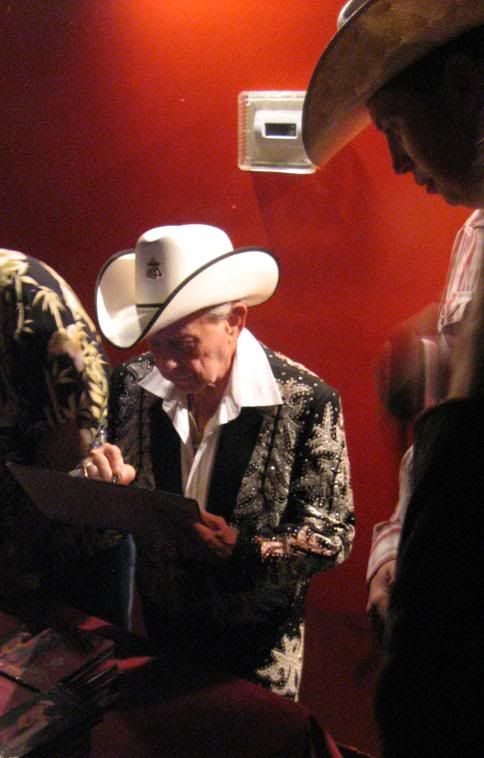
copyright © 2008 Wyatt Doyle
Click here to view, or click on Little Jimmy, below.

copyright © 2008 Wyatt Doyle
Monday, June 2, 2008
Subscribe to:
Posts (Atom)

